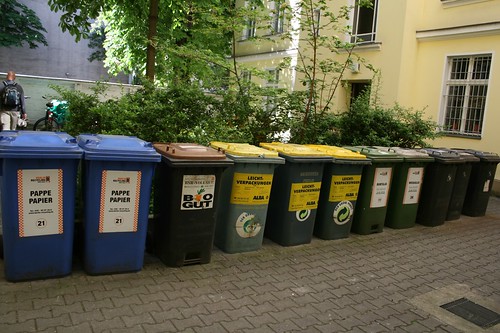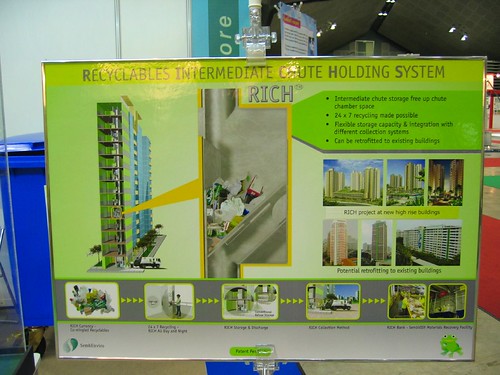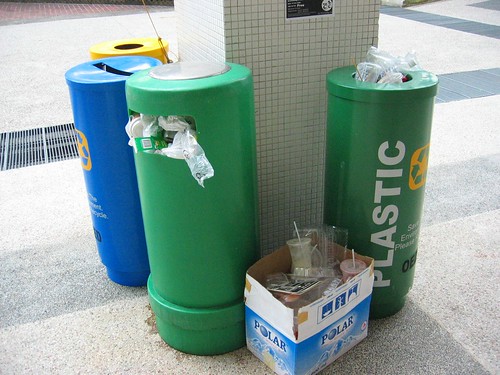
Ironically or not, in my most recent travels to Germany, I find myself noticing more environmentally sustainable practices in the everyday households than I did when I was on an official tour of waste management facilities as part of my Bayer sponsored trip. Whatever their reasons, the point is they are doing it.
What more, these are not individual initiatives, limited to the confines of one household but widespread neighborhood-, community-, city-, state- and nation-wide initiatives, some even mandated by law!
For example, the above photo was taken in the courtyard of my apartment block in Berlin, near the Savignyplatz area near downtown Berlin. Here, we see the usual recycling bins for the residents of the apartments but lo and behold, there is even a bin for "Bio Gut" which is essentially for all things organic. In other words, this is a separate bin for all organic products or "wet waste" as we call it. Not quite a community compost yet but it's a start!
The waste sorting here is so meticulous that it would not allow you to even mix your organic waste with your other papers or packaging waste. Of course the others beside it includes plastic, glass, paper and sometimes packaging waste is even distinguished from your usual plastics. In fact, in all waste bins at the airports and train stations in Germany, rubbish bins don't just come in one but they come in a connected threesome everywhere you go. There is especially one for packaging waste.
In another example in our rented apartment in Dresden, the capital of Saxony and former East Germany, the rubbish bin in the apartment, when you open the cover, you will find it is divided in 3 color-coded compartments! One for paper, one for plastic and the rest for miscellanea.
Perhaps this is why a rubbish chute in each home is not such a good idea after all. When you have to take all of your rubbish out to a central deposition area which comes with carefully indicated bins, it makes waste sorting so much easier.
This is really not about recycling. Nope, waste sorting and waste minimization goes far beyond mere recycling. It's about reducing the need for landfills which even incineration, to a point, cannot help reduce.
That's why in Germany, there is also a Container Deposit Legislation which "require that a deposit on carbonated, water or alcoholic beverage containers be collected when the beverage is sold. When the container is returned to an authorized redemption center, or the original seller in some states, the deposit is partially or completely refunded to the consumer."
This is called the Reverse Vending Machine. After digging around on the web for a really long time I finally found it because I was so enamored by it I didn't take any photos. This is taken from a UK website so it is widespread in Europe. The one in Germany is not quite the same but the feeder and receipt spitting out part as pictured is the same.
This really makes it very fun for the monkey when we go to the supermarket in Hamburg, the highlight of the trip was not shopping but popping plastic bottles into a giant plastic-eating machine which shreds up your bottles and then pay you for it. However, it does not directly pay you cash for your bottles but instead it prints out a receipt for your amount of refund and you can use this refund to get a discount and rebate off your purchases at the supermarket! What I find is more interesting is that it shreds the plastic which I suppose makes it easier for transportation and also as an alternative to melting down the plastic before remoulding, nowadays they pop these bits into a giant tumbler and let the heat do the work, or something to that effect.
They also have a Green Dot system that marks sales packaging in Germany since 1990 that from my poor understanding of babelfish-translated german, is more or less a system that includes the environmental cost of taking care of the lifecycle of a product packaging. It also indicates what can or cannot be recycled. Maybe somebody who understands German can explain this to me.
Technicalities aside, point being that there are tons of technology available these days and all that is lacking is the legislation and state-community effort to implement these legislation. 
Sembcorp's new recyclable chutes project
So perhaps HDB flats are of a much higher density than the apartments in Germany which would result in logistic problems if everybody have to step out of their homes to put out their waste and sort them at the same time. But is it just laziness talking? Sembcorp wants to build built-in recycling chutes in addition to our usual rubbish chute and perhaps that is an alternative and a beginning step. Another popular argument is that our tropical climate do not allow for organic waste to contribute to compost bins in homes as it would smell and vectors would develop. Honestly my sister's compost on her balcony in Hamburg, Germany see hosts of flies everyday but for some reason they never enter the house. Sure she claims it smells when she opens the box but I personally never smell it. What more, Universiti Sains Malaysia in Penang has a very successful vermiculture (read: compost) project on campus! How is it that we could not?
But sometimes I feel Singaporeans don't even know how to dispose of their rubbish properly, much less talk about waste sorting or even composting. No wonder we worry about vectors.
Just look at how much of that is packaging waste alone!
Saturday, May 12, 2007
Taking waste to a higher level
Posted by
Monkey
at
Saturday, May 12, 2007
![]()
Labels: Environment, Travels

 I can be contacted at
I can be contacted at 







3 comments:
Hi. Any answers for me. I just got back from the UK where I saw my pals lovely compost bin. Can we compost here in Malaysia or am I inviting red ants and rats and a horrid stink into my 6 by 12 metre garden? Do you know where I can get information on composting here in the tropics. Thanks ... I'm poised with my carrot peelings!!!!
Hi Rachel,
I hope you get this reply since you did not include an email address for reply.
I have two links for you:
http://www.organicorigins.com.sg
The owner of Organic Origins wrote a fantastic article introducing composting.
http://www.gardeningsingapore.org/article=0005.htm
Organic Origins website also include a bunch of articles to dispell myths and answer your questions about pest and smell which I assure you, will not be a problem, if you do things correctly :)
Hi, I would like to use some of the material in your blog as part of a research paper. Please can you contact me? carwynfowler(at)hotmail.co.uk
Post a Comment